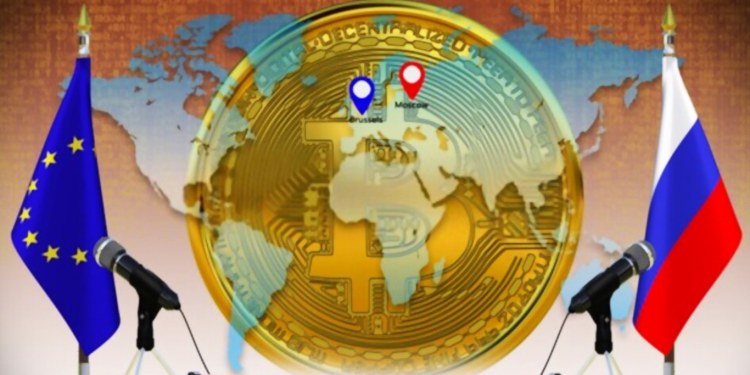CoinDesk was the first to report about the EU’s crypto sanctions on Russia. The European Union has affirmed a sweeping ban on giving Russians crypto services. The EU tightened sanctions per the “sham” secession votes in Ukraine’s four areas. These sanctions are now in the EU bloc’s official journal, giving them legal effect.
The crypto ban took effect later on Thursday. The banning statement appeared in the bloc’s official journal, stopping European Crypto providers from offering Russian residents and firms crypto services unless they reside in the bloc.
After Ukraine’s invasion in February, the bloc presented the eighth set of political and economic rules against Russia. This tightened a previous measure that reduced crypto payments to European wallets to 10,000 euros.
To affirm the prohibitions, the European Commission reported that,
“The existing prohibitions on crypto assets have been tightened by banning all crypto-asset wallets, accounts, or custody services, irrespective of the amount of the wallet.”
The EU commission made this statement after EU governments signed off on proposals it made last week.
Reasons for the Ban
The measure the EU set up against Russia primarily aimed at capping the price of oil that Russia can sell. This came after Russia attempted to annex regions Luhansk, Kherson, Donetsk, and Zaporizhzhia.
However, according to CoinDesk, the 10,000 limiting measure was not sufficiently stopping payments from Russia. As a result, the EU banned all crypto payments from European wallet crypto service providers to Russians.
The European Union operators disclosed these to CoinDesk:
“We realized that transactions were still going on on some scale” even after measures were imposed in April, an EU official said. “We wanted to ensure that these services are not rendered anymore.”
Contrastingly, a European official who was not allowed to speak on the record disclosed that the EU’s reasons behind the ban might be dependent on copycat guidelines from other European jurisdictions.
“Switzerland, in particular, has been following all our [sanctions] measures in the past,” said the EU official. “We count that this is going to happen here as well.”
The Eighth Package of Sanctions Against Russia
The EU commission formulated this package to respond to Russia’s illegal wars against Ukraine, especially the unlawful annexation of Ukraine’s territory per sham “referenda.” In addition, Russia issued open nuclear threats to Ukraine and mobilized additional troops.
The package introduced a new EU import ban of 7 billion euros to stop Russia’s revenues. Additionally, the box introduced export restrictions against Russia to deprive the Kremlin’s military and industrial components of technologies.
The export restrictions will further deprive Russia of European expertise and services. The sanctions also deprived the Russian army and its suppliers of the equipment and goods they needed to start a war on Ukraine. The sanctions also outlined the basis for the required legal framework to implement the oil price cap.
Closing Thoughts
In summary, the eighth package contains the following: restriction extension to Zaporizhzhia and Kherson, new export restrictions, state-owned enterprise restrictions, additional listings, sanctions circumvention, and implementation of the oil cap. Also, the package contained financial IT consultancy and other businesses.














